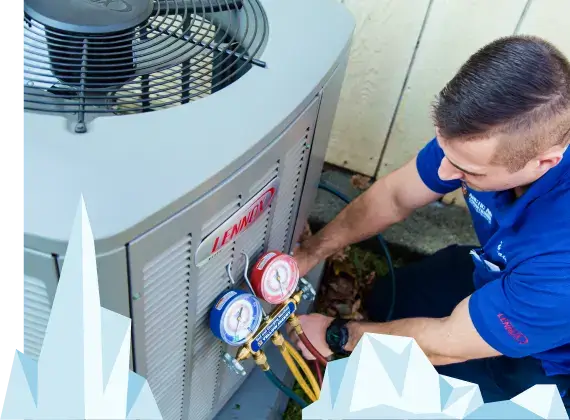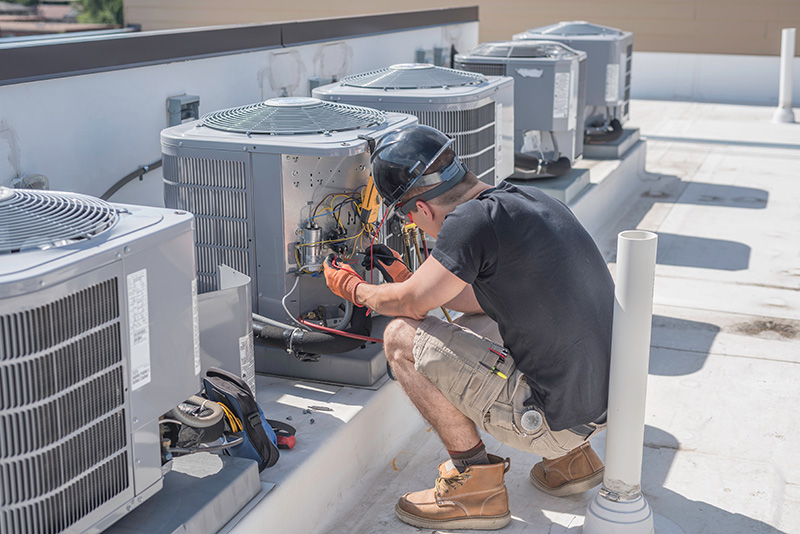Keep Your HVAC System Optimal with Help from DMAKS HVAC.
Keep Your HVAC System Optimal with Help from DMAKS HVAC.
Blog Article
How to Choose the Right Heating And Cooling System for Your Demands
Choosing the ideal A/c system is a vital decision that needs careful consideration of various factors. The myriad of system types available can complicate this process, leading one to question which course eventually leads to optimal convenience and performance.
Examine Your Home Dimension
Analyzing your home size is an important very first step in selecting the appropriate a/c system. The dimension of your home straight affects the heating & cooling capability required for reliable environment control. An a/c system that is too small will certainly have a hard time to keep comfy temperature levels, causing boosted power consumption and use on the device. On the other hand, a large system can cause brief cycling, inadequate humidity control, and ineffective procedure.
To precisely assess your home dimension, gauge the square video of each space, considering factors such as ceiling height and the design. Additionally, think about the insulation high quality and the number of home windows, as these components impact thermal performance. Residences with open layout might require various system arrangements compared to those with lots of split spaces.
Making Use Of the Handbook J load calculation method can give an extra precise quote of your cooling and heating requires. This technique make up different elements, including neighborhood environment, solar gain, and occupancy patterns. By meticulously evaluating these facets, you can make certain that your picked a/c system is suitably sized, causing enhanced convenience, power performance, and longevity of the equipment.
Determine Your Budget Plan
Determining your budget is a pivotal action in the heating and cooling system option process, as it sets the parameters for your options - DMAKS HVAC. A heating and cooling system is a considerable investment, and recognizing your financial restrictions will help limit selections that fit within your means
Begin by analyzing not only the initial acquisition rate yet additionally installment prices, which can differ significantly depending upon the intricacy of the project. Think about ongoing expenses such as maintenance, repairs, and energy usage. A system might show up inexpensive originally but can result in greater costs gradually if it is less reliable.
It is advisable to allot a contingency fund for unanticipated costs that might emerge throughout installment or initial system modifications (DMAKS HVAC). Furthermore, explore financing alternatives or discounts that may be readily available, as these can alleviate the concern of in advance prices
Ultimately, having a clear budget allows you to engage with HVAC professionals extra successfully, ensuring you obtain customized recommendations that straightens with your financial objectives and home requirements. By being attentive concerning your spending plan, you can make educated choices that improve comfort without endangering economic security.
Evaluate Energy Effectiveness
Energy performance plays a vital role in the overall performance and cost-effectiveness of your Heating and cooling system. Look for systems with a high Seasonal Power Efficiency Proportion (SEER) for Get the facts cooling and a high Annual Gas Utilization Efficiency (AFUE) score for heating.
Additionally, consider the Energy Star qualification, which indicates that the system meets rigid performance standards set by the Environmental Protection Agency. Buying a Power Star-rated heating and cooling system can result in considerable savings with time, especially in locations with extreme temperature changes.
An additional variable to review is the system's size and capability. A large or undersized system can cause inadequacy and enhanced energy prices. DMAKS HVAC. Proper sizing, often determined via a Hand-operated J tons calculation, makes certain that the system operates at ideal effectiveness


Take Into Consideration Environment and Environment
When choosing an a/c system, it is important to take into consideration the neighborhood environment and environmental problems, as these aspects substantially influence the system's efficiency and performance. Various areas experience differing temperature extremes, moisture levels, and seasonal changes, all of which impact heating and cooling needs.

Additionally, local ecological variables, such as air quality and prospective allergens, should educate your choice. Systems outfitted with innovative filtering modern technologies can visit our website help mitigate contaminants and supply cleaner air. In addition, think about the power sources available in your location-- some HVAC systems are a lot more reliable when powered by all-natural gas or renewable resource sources.
Eventually, aligning your cooling and heating system choice with your regional environment and environmental factors to consider will certainly lead to enhanced convenience, boosted effectiveness, and lower energy prices.
Explore System Types and Attributes
As homeowners seek to enhance comfort and effectiveness, exploring the different kinds of heating and cooling systems and their unique features comes to be necessary. The primary sorts of a/c systems consist of air conditioning, heatpump, ductless mini-split systems, and heaters. Each system supplies distinct advantages tailored to different needs and choices.
Central air systems give uniform air conditioning throughout a home, making them suitable for website here bigger rooms. Warmth pumps work as both home heating and cooling down solutions, utilizing electrical energy to move warmth, which can lead to lower power costs. Ductless mini-split systems are becoming progressively preferred because of their versatility and ease of setup, enabling property owners to control the temperature level in private rooms without substantial ductwork.

Conclusion
To conclude, choosing the suitable heating and cooling system necessitates mindful consideration of numerous variables, consisting of home dimension, budget restrictions, power efficiency, local climate, and readily available system types. A thorough evaluation of these components makes certain optimum comfort and cost-effectiveness. By following a structured technique, homeowners can make informed choices that align with their particular demands and preferences, inevitably bring about improved interior air high quality and power financial savings.
Report this page